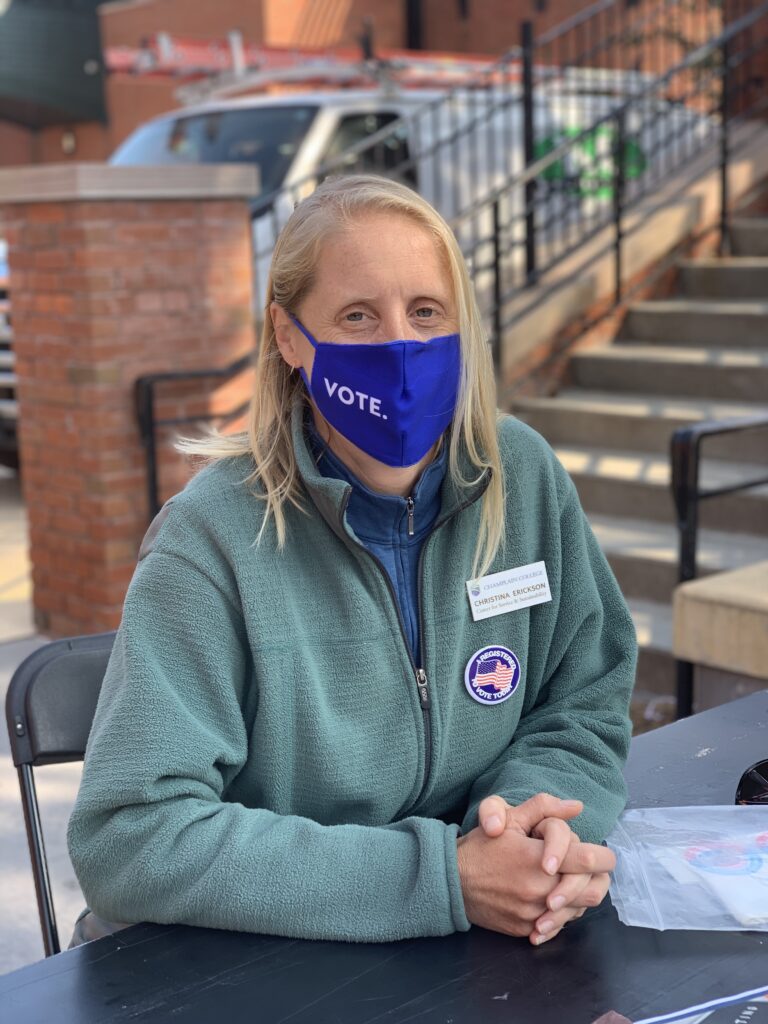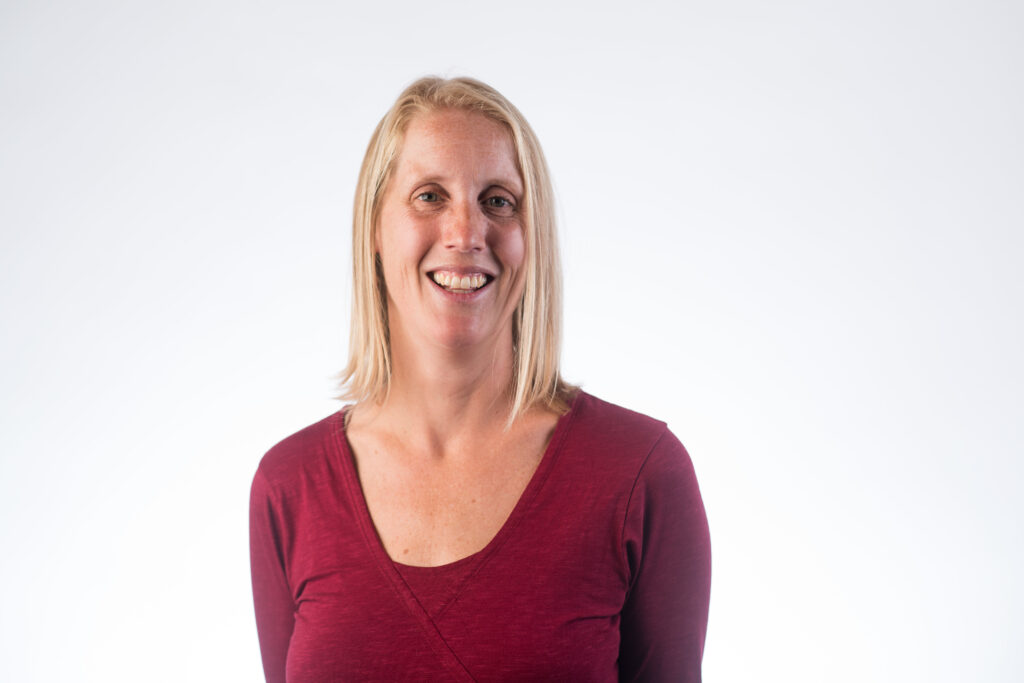A Q&A with the Center for Service & Sustainability Director, Christina Erickson.
Welcome to Earth Month! We will be highlighting various facets and faces among the Champlain community this month that help us move the needle toward a sustainable future.
An ever-present figure on campus, Christina Erickson is known for pushing Champlain College’s sustainability practices forward. From composting and improving transportation initiatives, to tracking the college’s landfill contributions and advising Eco-Reps and service-learning courses, the Center for Service & Sustainability Director is dedicated to guiding Champlain through this challenging work.
Erickson joined Champlain in Fall 2009 as a part-time Sustainability Coordinator and has expand her reach ever since. Having pitched the idea in 2016 to transform the former Center for Service and Civic Engagement into the Center for Service & Sustainability, she now spearheads the institution’s vision to “empower the members of our learning community to advance social justice and responsible environmental stewardship in our classrooms, on our campus, and throughout the world.”
This Earth Month, Erickson shares her insights and inspiration around her work.


Q: What does the Center for Service & Sustainability mean to you?
A: It means that we have an opportunity for our campus community to engage in meaningful ways working toward systemic change. We have programs such as Eco-Reps and service-learning courses that connect learning and doing. We have initiatives like #CivicChamp and Sustain Champlain that are launching pads for us to scale up our influence on making a positive impact, socially, and environmentally. We have a person (me!) that tries to keep these important topics included in institutional planning and policies.
Q: What is one change you recommend someone makes if they want to live more sustainably?
A: Well, one would be to turn stuff off when you’re not using it, whether that’s lights, your gaming system, your mega computer, or the water when you’re brushing your teeth — or not taking an 82-hour shower. Second, separate your waste properly. Take the time to separate those things out into trash, compost, recycling, e-waste. If you have extra clothes, bring them to the Swap Shop. So it really comes down to that: turn stuff off and sort out your stuff and deal with it properly.
Q: What do you think makes Champlain such a powerful experience for students?
A: We have such rich opportunities on our campus and within our community for students to engage with a wide array of sustainability projects. I refer to the United Nations Sustainable Development Goals, UNSDGs, for what is under the broad sustainability umbrella, either in their academic or co-curricular experience. Our physical campus is a laboratory itself, from our community gardens to energy monitoring systems. Our greater Burlington community is small enough that it’s easy to connect students with organizations, businesses, government, etc. — and that ease of access can’t be found just anywhere.


Q: What do you like about Burlington?
A: I love Burlington. It’s where I live, where my kid goes to school, where I’m an engaged community member, where I know the nooks and crannies off of the beaten path, where I can find undeveloped land within city limits, have access to the lake, and I love sharing all of those aspects with students and my colleagues. It’s why I developed the COR 104 course, “Making a Sense of Place,” for first-year students. This Core class addresses the question, “How does one cultivate a relationship with the natural world?” among others. Students in the class participate in a place-based food systems service-learning project in Burlington. This is my second time teaching the course, and it’s been a fantastic way for students, especially those new to Burlington or Vermont, to get to know the area, its people, and history.
I’ve only lived in Burlington since 2006, but it has become my home, my chosen place, my community. I get excited sharing that sense of place with others. Are Burlington and Vermont perfect? Heck no. But I appreciate how many people are willing to make it better.
My favorite walking/running loop from my house in the Old North End is my favorite place in Burlington. Down Depot Street, along the bike path, take the beach route from Texaco Beach to North Beach, and then up through the campground and back along North Ave. Sometimes with an extension into the Arms Forest, a lovely gem of a wooded area.
Q: Can you discuss the Center for Service and Sustainability’s influence on Champlain’s 2030 Strategic Plan?
A: There are several people, myself included, who were rather relentless during the strategic planning process to keep sustainability part of the conversation. I think our biggest success is Goal 6.5: Champlain will model its commitment to sustainability through efficient facilities and operations management and will make progress toward carbon neutrality [from the 2030 Strategic Plan]. The big project is to now create a more detailed subplan, Sustainability Action Plan 2.0, on how to make this happen.
One new initiative that we’re excited about is a new sustainability themed residential experience for students, to start in Fall 2022. Applied Sustainability Program Director Valerie Esposito, Environmental Studies & Policy senior Kyle Harrison, and I are working on this project with the Res Life team. We’re still working out the details, but students can choose to live in this hall with others who have common interest in sustainability.
This themed residential house will provide an opportunity for students to practice and explore environmentalism in a real-world setting through activities and events such as outing trips, gardening, culinary skills, film screenings, crafting workshops, and outdoor recreation. The idea for this came from a few past senior capstone projects, and we’re so excited to see it come to reality next year!
Q: What advice do you have for students thinking about coming to Champlain?
A: Come to Champlain and Burlington with an open mind and heart. There is so much to learn and explore and get involved with. The beauty of our size is that you can easily personalize your education. The beauty of our community is that people, from elected officials to faculty, are approachable. The beauty of our location is that it is beautiful.
Want to learn more about Champlain’s Center for Service and Sustainability? Visit our website.